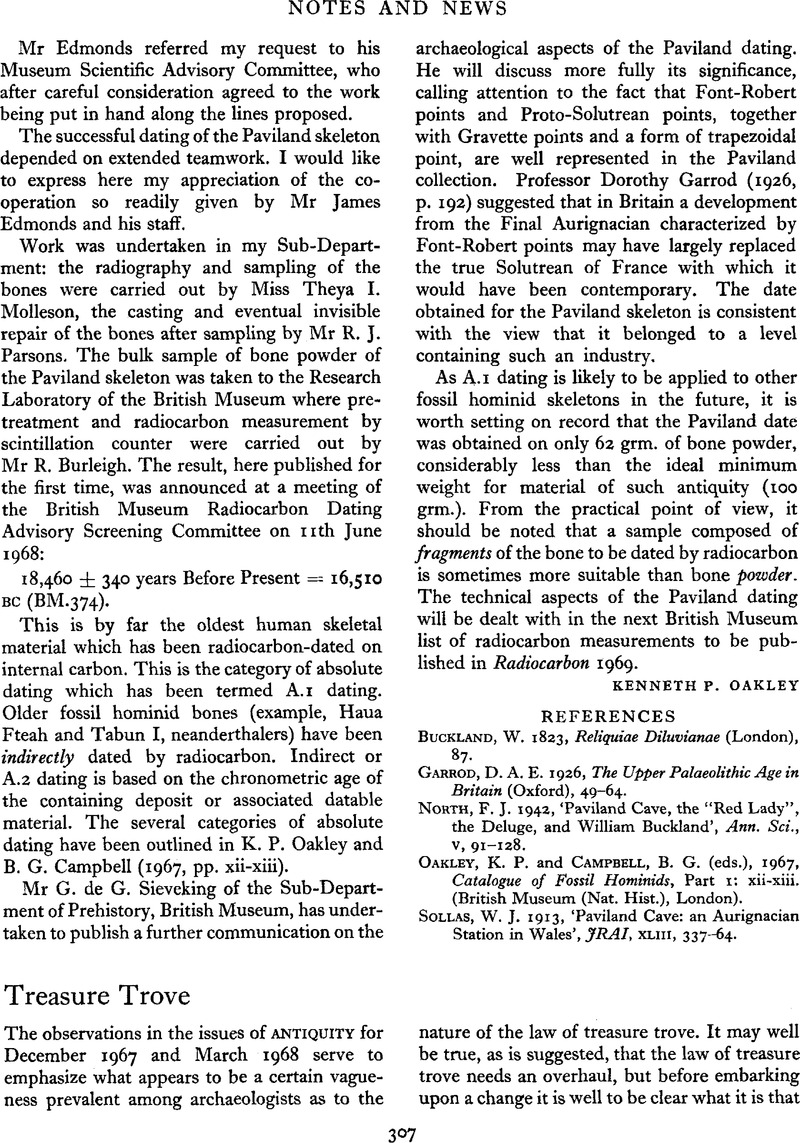Article contents
Abstract

- Type
- Notes and News
- Information
- Copyright
- Copyright © Antiquity Publications Ltd 1968
References
Notes
[1] 3 Co. Inst. 132, 133. Blackstone’s definition (1 Bl. Com. (14th ed.) 295) might seem to imply that treasure trove extends to articles other than gold or silver, but the term treasure trove appears invariably as used only in relation to gold or silver articles.
[2] 3 Co. Inst. 132; Chitty’s Prerogatives of the Crown, 152, cited with approval by Stirling, J., in Attorney-General v. Moore, [1895] 1 Ch. 676, at p. 683Google Scholar, and by Farwell, J., in Attorney-General v. British Museum Trustees, [1904] 2 Ch. 598, at p. 608.Google Scholar
[3] 3 Co. Inst. 132; I Bl. Com. (14th ed.) 295.
[4] Brae., lib. 3, De Corona, c. 3, f. 118; 3 Co. Inst. 132; 1 Bl. Com. (14th ed.) 296; Armory v. Delamirie (1722)Google Scholar, 1 Stra. 505; 1 Sm. L. C. (nth ed.) 356. See the observations of Farwell, J., in Attorney-General v. British Museum Trustees, [1903] 2 Ch. 598, at p. 608Google Scholar: ‘If the owner, instead of hiding the treasure, casually lost it, or purposely parted with it in such a manner that it is evident he intended to abandon the property altogether, and did not purpose to resume it on another occasion, or if he threw it on the ground, or other public place, or in the sea, the first finder is entitled to the property as against everyone but the owner, and the King’s prerogative does not in this respect obtain. So that it is the hiding, and not the abandonment of the property that entitled the King to it.’
[5] Attorney-General v. British Museum Trustees, [1903] 2 Ch. 598, at p. 613.
[6] Attorney-General v. British Museum Trustees, [1903] 2 Ch. 598, at pp. 609, 610.
[7] Attorney-General v. British Museum Trustees, [1903] 2 Ch. 598, at p. 613.
[8] 3 Co. Inst. 133; R. v. Thomas and Willett (1863), Le. & Ca. 313; R. v. Toole (1867), 11 Cox C. C. 75. And see Home Office Circular No. 68/1955, section V.
[9] See Coroners Act, 1887, s. 36. The Coroners Rules, 1953, do not apply to inquisitions on treasure trove.
[10] See 4 Edw. I, stat. 2 (De officio coronatoris) (1276), which is declaratory of the common law although repealed by the Coroners Act, 1877; see s. 36 of the Act of 1877.
[11] See Attorney-General v. Moore, [1893] 1 Ch. 676; Attorney-General v. British Museum Trustees, [1903] 3 Ch. 598.
[12] Home Office Instruction 159308/14, dated 30th June 1925; Home Office Instruction 159308/47, dated 12th June 1931; Home Office Circular No. 68/1955.
- 1
- Cited by


